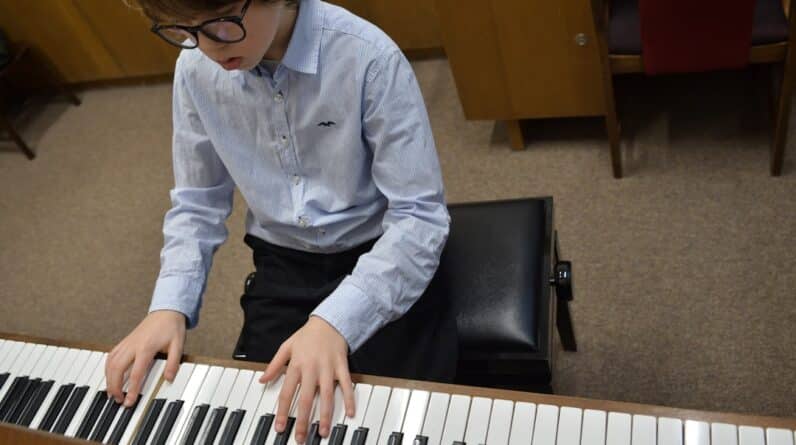
Stage presence is a vital component of any performance, whether you are a seasoned artist or just starting your journey in the world of music. It encompasses the ability to captivate an audience, drawing them into your performance and making them feel a part of the experience. When you step onto a stage, you are not just delivering notes and lyrics; you are sharing a piece of yourself.
This connection is what transforms a simple performance into an unforgettable experience. You may have noticed that some performers seem to light up the stage, effortlessly commanding attention and creating an electric atmosphere. This is the power of stage presence, and it is something that can be cultivated and developed over time.
Understanding the importance of stage presence goes beyond mere charisma; it involves recognizing how your energy, body language, and emotional expression can influence the audience’s perception of your performance. When you engage with your audience, you create a shared experience that resonates on a deeper level. This connection can evoke emotions, spark memories, and even inspire action.
As you work on your stage presence, consider how you can use your unique personality to enhance your performances. Embrace the idea that every time you perform, you have the opportunity to leave a lasting impression on those who are watching.
Key Takeaways
- Stage presence is crucial for capturing and maintaining audience attention
- Singing courses can help build confidence and overcome stage fright
- Vocal and physical techniques are essential for engaging the audience
- Emotional expression is key to connecting with the audience
- Performance techniques learned in singing courses can enhance stage presence and create impactful performances
Building confidence through singing courses
One of the most effective ways to build confidence as a performer is through singing courses. These courses provide structured learning environments where you can hone your vocal skills while also developing your stage presence. In a supportive setting, you can explore various techniques that not only improve your singing but also boost your self-assurance.
As you progress through these courses, you will likely find that your confidence grows alongside your vocal abilities. This newfound confidence will empower you to take risks on stage, experiment with different styles, and truly express yourself through your music. Moreover, singing courses often include opportunities for performance practice, which is essential for building confidence.
By performing in front of peers and instructors, you can receive constructive feedback that helps you identify areas for improvement while also reinforcing your strengths. This process allows you to become more comfortable with being in the spotlight, gradually diminishing any fears or anxieties you may have about performing live. As you continue to engage in these courses, you’ll find that each performance becomes less daunting and more exhilarating, paving the way for a more confident and authentic stage presence.
Developing vocal and physical techniques to engage the audience

To truly engage an audience, it is essential to develop both vocal and physical techniques that complement each other. Your voice is your primary instrument, and mastering it involves understanding breath control, pitch accuracy, and vocal dynamics. As you work on these aspects in your singing courses, pay attention to how they affect your overall performance.
A well-controlled voice can convey a range of emotions, from joy to sorrow, and can draw listeners in like nothing else. Experimenting with different vocal techniques will allow you to discover what resonates best with your style and audience. In addition to vocal techniques, physicality plays a crucial role in engaging an audience.
Your body language communicates just as much as your voice does; therefore, it is important to be aware of how you carry yourself on stage. Simple gestures, facial expressions, and movement can enhance your performance significantly. For instance, making eye contact with audience members can create a sense of intimacy and connection.
Practicing physical techniques alongside vocal exercises will help you develop a cohesive performance style that captivates your audience from start to finish.
Connecting with the audience through emotional expression
Emotional expression is at the heart of any memorable performance. When you connect with your audience on an emotional level, you create a bond that transcends mere entertainment. This connection can be achieved through storytelling, vulnerability, and authenticity in your delivery.
As you perform, think about the emotions behind the lyrics and how they relate to your own experiences. By tapping into these feelings, you can convey genuine emotion that resonates with listeners, making them feel as though they are part of your journey. To enhance this emotional connection, consider incorporating personal anecdotes or stories into your performances.
Sharing moments from your life that relate to the song can create a deeper understanding for the audience and invite them into your world. Additionally, practicing mindfulness techniques can help you stay present during performances, allowing you to fully immerse yourself in the moment and connect with your audience more profoundly. The more authentic and emotionally engaged you are on stage, the more likely it is that your audience will respond positively to your performance.
Utilizing performance techniques to enhance stage presence
Performance techniques are essential tools for enhancing your stage presence and ensuring that your performances are engaging and memorable. These techniques can range from vocal warm-ups to movement exercises that help you feel more comfortable on stage. One effective technique is to incorporate dynamic movements into your performance; this could involve dancing or simply using gestures that complement the music.
Movement not only adds visual interest but also helps convey the emotions of the song more effectively. Another important aspect of performance techniques is understanding how to use space on stage. Being aware of your surroundings allows you to interact with different areas of the stage and engage various sections of the audience.
For example, moving closer to one side of the stage can create a sense of intimacy with those audience members while also drawing attention away from other areas momentarily. Practicing these techniques during rehearsals will help you feel more at ease when performing live, allowing you to focus on connecting with your audience rather than worrying about what to do next.
Overcoming stage fright and nerves through singing courses

Stage fright is a common challenge faced by many performers, but it doesn’t have to hold you back from sharing your talent with the world. Singing courses often provide valuable strategies for overcoming nerves and building resilience in high-pressure situations. Through guided practice and exposure to live performances in a supportive environment, you can learn how to manage anxiety effectively.
Techniques such as deep breathing exercises or visualization can help calm your mind before stepping onto the stage. Additionally, sharing experiences with fellow students can be incredibly beneficial in overcoming stage fright. Knowing that others face similar challenges can foster a sense of camaraderie and support within the group.
As you progress through singing courses together, you’ll likely find that discussing fears and anxieties becomes easier over time. This shared experience not only helps normalize feelings of nervousness but also encourages personal growth as you learn from one another’s journeys.
Creating a memorable and impactful performance through singing courses
Creating a memorable performance involves careful planning and execution, both of which can be enhanced through singing courses. These courses often emphasize the importance of preparation, encouraging you to develop setlists that flow well together while showcasing your unique style. By carefully selecting songs that resonate with both you and your audience, you can create an impactful experience that lingers long after the final note has been sung.
Moreover, singing courses often provide insights into how to incorporate elements such as lighting, staging, and costume choices into your performances. These aspects contribute significantly to the overall atmosphere and can elevate a good performance into something truly extraordinary. By paying attention to these details and integrating them into your practice sessions, you’ll be better equipped to deliver performances that leave a lasting impression on your audience.
Applying learned skills to connect with the audience in various performance settings
The skills you’ve developed through singing courses are not limited to one specific type of performance; they can be applied across various settings, from intimate gatherings to large concerts. Understanding how to adapt your stage presence based on the environment is crucial for connecting with different audiences effectively. For instance, in smaller venues, a more personal approach may be appropriate—engaging directly with individuals in the crowd while sharing stories or insights about the songs you’re performing.
Conversely, larger venues may require a more dynamic approach where projecting energy and engaging with the entire audience becomes essential. Utilizing learned skills such as vocal projection, movement techniques, and emotional expression will allow you to connect with listeners regardless of the setting. As you continue to perform in diverse environments, you’ll gain valuable experience that further enhances your ability to engage audiences effectively.
In conclusion, developing stage presence is an ongoing journey that requires dedication and practice. Through singing courses, you have the opportunity to build confidence, refine vocal techniques, connect emotionally with audiences, and overcome stage fright—all essential components for creating memorable performances. By applying these skills across various settings, you’ll not only enhance your own artistry but also create meaningful connections with those who come to experience your music.
FAQs
What are singing courses?
Singing courses are educational programs designed to help individuals improve their singing skills, including vocal technique, performance skills, and stage presence.
How do singing courses help participants develop stage presence?
Singing courses often include training in stage presence, which involves teaching participants how to engage with the audience, use body language effectively, and project confidence while performing.
How do singing courses help participants connect with their audience?
Singing courses often include exercises and techniques to help participants connect with their audience on an emotional level, such as interpreting lyrics, conveying emotions through singing, and establishing a rapport with the audience.
What are the benefits of developing stage presence and connecting with the audience in singing?
Developing stage presence and connecting with the audience can help singers create a more engaging and memorable performance, build a stronger connection with their audience, and ultimately enhance their overall singing experience.





